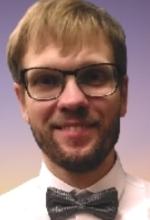Biochemistry 2025
In this course, we shall discuss the molecular basis for the functioning of biological systems and the main biochemical processes underlying the general metabolism of carbohydrates, proteins, lipids, and nucleic acids. Special attention is focused on the coordination of the metabolism of different biological compounds and their regulation by vitamins and hormones. Besides the classic enzymatic metabolism, this course presents the modern understanding of non-enzymatic processes and their role in the functioning of living organisms.
All lectures and seminars of this course are 2 h. For seminars, students will be divided into 2 groups. All classes will be given in Ukrainian.
General aspects of metabolism: anabolism and catabolism. Thermodynamic bases of metabolism. The first and second laws of thermodynamics. Endergonic and exergonic reactions. Metabolic pathways. Oxidation and reduction reactions. Redox potential. The Nernst equation. Biological oxidation. High energy phosphates. Chemical structure and biological role of ATP.
Carbohydrates: general characteristics and their role in metabolism and organismal energy supply. Metabolism of glycogen: chemistry, biological sense and reciprocal regulation of glycogen metabolism by cyclic AMP. Biological role and chemistry of the glycolytic pathway. Fate of pyruvate after glycolysis.
General aspects of aerobic cellular respiration. Chemistry and biological significance of oxidative decarboxylation of pyruvate and tricarboxylic acid cycle (TCA). Their regulation. Substrate-level phosphorylation. Energy balance of complete glucose oxidation. Modified TCA pathways.
General characteristics and principle of functioning of the mitochondrial electron transport chain. Mechanism of oxidative phosphorylation. Chemi-osmotic theory. ATP synthase. Regulation of oxidative phosphorylation. The mitochondrial electron transport chain as a source of free radicals. General aspects and biological significance of non-mitochondrial electron transport chains.
Localization of mitochondria in the cell. The structure of mitochondria. Connection with the endoplasmic reticulum. Features of mitochondrial DNA.
Physiology of muscles. Secretion of insulin and hydrochloric acid. Hereditary mitochondrial diseases, ischemia, diabetes, stroke, etc.
Gluconeogenesis: chemistry and biological sense. Entrance of lactate, glycerol, alanine, and propionate in gluconeogenesis. The interplay between glycolysis and gluconeogenesis. Cori cycle. Reciprocal regulation of glycolysis and gluconeogenesis. Futile cycles.
Pentose phosphate pathway: chemistry, regulation, and biological sense. The interplay between pentose phosphate pathway and glycolysis. Polyol pathway, chemistry, and its biological role. Entrance of fructose and galactose in glycolysis. Metabolism of alcohol.
Lipids: general characteristics and their role in metabolism and organismal energy supply. Catabolism of triacylglycerides: the role of hormones. Fatty acid oxidation: activation and transport across the mitochondrial membrane. β-oxidation of saturated fatty acids with an even number of carbon atoms. Energy balance of complete oxidation of palmitic acid. Oxidation of unsaturated fatty acids. Oxidation of fatty acids with an odd number of carbon atoms. α- and ω-oxidation of fatty acids.
Biosynthesis of fatty acids: shuttle mechanism of acetyl-CoA transportation across the mitochondrial membrane, formation of malonyl-CoA. Biosynthesis of saturated and unsaturated fatty acids. Regulation of oxidation and synthesis of fatty acids. Biosynthesis of triacylglycerides and phospholipids.
Biological role, chemistry, and regulation of cholesterol biosynthesis. Inhibitors of the process, statins. Biotransformation and degradation of cholesterol. General characteristics, biological role, and metabolism of ketone bodies and eicosanoids.
Biopolymers. Diffusion and size of molecules. Covalent, hydrogen, ionic, and disulfide bonds. Primary, secondary, and tertiary structure of proteins. Relationship between amino acid sequence and secondary structure of proteins. Chemistry of nucleic acids. Complementarity of double-stranded nucleic acids. Methods to study DNA and RNA structure.
Proteins and amino acids: general characteristics and their role in metabolism and organismal energy supply. General pathways of catabolism of amino acids. The role of vitamins. Deamination of amino acids: types and general characteristics. Oxidative deamination of amino acids: role of glutamic acid. Transamination of amino acids: mechanism and biological significance. Non-direct deamination. The role of glutamic and aspartic acids. Transreamination. Synthesis of non-essential amino acids. Decarboxylation of amino acids and their derivatives. Biogenic amines.
Ammonia binding, transportation, and detoxification. Ammonia metabolism in animals. Urea biosynthesis. Relationship between tricarboxylic acids and the ornithine cycles (Krebs bicycle).
Integration of metabolism.Coordination of carbohydrate, lipid, and protein metabolism. Involvement of vitamins and hormones in the metabolism regulation. Nucleic acids: general characteristics, structure, and functions. Degradation and biosynthesis of purine and pyrimidine nucleotides. General characteristics, chemistry, biological role, and regulation of the processes. Disturbance of nucleotide metabolism.
General characteristics of free radicals and reactive oxygen species and their reactions. Non-enzymatic glycosylation (glycation). General characteristics of reactive carbonyl species and advanced glycation end products. Generation of reactive oxygen and carbonyl species in living systems, their reaction with cellular constituents. Mechanisms of protection against the reactive forms. Glycoxidation. "Useful" role of reactive species: signaling and involvement in immune response.
Analysis of the theories of "chemical damage" of biomolecules. General aspects of the theory of oxidative/carbonyl stress. Chronic and acute oxidative/carbonyl stress. "Aging" of biomolecules and defensive systems against reactive oxygen and carbonyl species.
Coordination of carbohydrate, lipid, and protein metabolism. Involvement of vitamins and hormones in the metabolism regulation.
Macronutrients (carbohydrates, lipids, and proteins), micronutrients (vitamins and trace elements). The human body's needs for nutrients. Physiological energy needs vs the energy value of essential nutrients, including carbohydrates, lipids, and proteins. Nutrient value of common foods. Rational approaches to nutrition. Trace elements and vitamins in human nutrition: preventive and curative aspects of human disorders.






